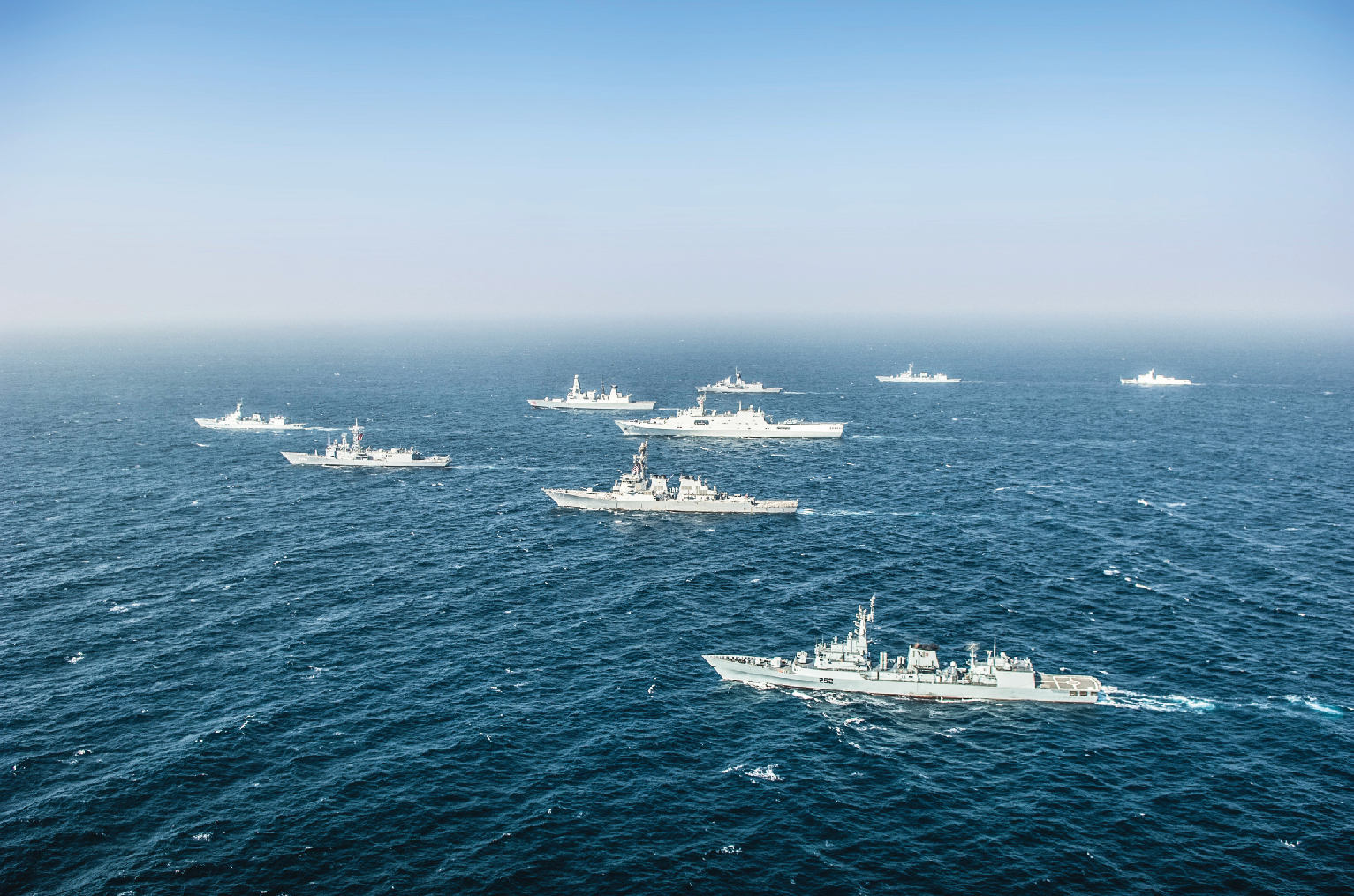
As one of the top troop-contributing countries, Pakistan deeply values the vital role played by “blue helmets” in maintaining security and stability in many conflict-ridden areas around the world.
Prof. Dr. Zafar Nawaz Jaspal
The states require a systemic balance between both soft power and hard power capabilities to pursue their national interests in contemporary geopolitics. The soft power resources at the disposal of government machinery are a critical part of the foreign policy tools needed to maximize the state’s interests in the anarchical international society. The states skillful in using soft power to facilitate positive collaboration are in an advantageous position in the current globalized interdependent world. This leads to two interlinked questions: how can soft power be deployed effectively? Second, is AMAN Exercise 2023 a soft power real tool?

A basic understanding of soft power and a precise explanation of the AMAN Exercise 2023 seems imperative for answering these questions.
Soft power—”the ability of a country to persuade others to do what it wants without force or coercion”—describes the use of positive attraction and persuasion to achieve foreign policy objectives. Joseph Nye in the late 1980s coined the term soft power and identified three primary sources of the concept of soft power i.e. political culture, science, and foreign policy.
However, within these three categories, the individual sources of soft power are manifold and varied. For instance, ‘attractiveness of a country’s economic model, business friendliness, capacity for scientific innovation, human resource proficiency, contribution to scholarship entailing academic exchanges, commitment to freedom, human rights, and democracy,’ etc. Presently, soft power is viewed as the best tool to attract foreign direct investment, tourism, and merchandise.
Pakistan can improve its economic prosperity by projecting its soft power, with the help of its cultural heritage, companies and workforce professionalism, foundations, universities, sports, and other institutions of civil society. Notably, the government machinery/institutions have a cardinal responsibility in fostering and enunciating the soft power image of the nation. In this context, the armed forces of Pakistan have been performing their responsibility proficiently through humanitarian intervention and being part of the United Nations peacekeeping corps—blue helmets.

As one of the top troop-contributing countries, Pakistan deeply values the vital role played by “blue helmets” in maintaining security and stability in many conflict-ridden areas around the world.” For example, over 200,000 Pakistani service men and women had served with honor and valor in 46 UN Missions in almost all continents of the world since 1960. Pakistan Navy participated in the United Nations-mandated Combined Maritime Task Forces 150 & 151 in regional and extra-regional joint bilateral and multilateral Exercises intended for ‘peaceful coexistence’ and desire for greater regional harmony and cooperation.
Since 2007, Pakistan has been hosting the biannual multinational AMAN (peace) Exercise for collective maritime security. The Exercise is not a war game but drills against nontraditional security threats. Despite having competing strategic objectives, through Aman 2021, the many international navies learn from one another to defeat piracy, maritime terrorism, drugs and arms trafficking, human smuggling, and other threats in the maritime domain. The growing number of participating countries made AMAN a major multinational Exercise for exhibiting a common resolve against crimes and illicit activities in the maritime domain. Besides, it reflects growing trust in the Pakistan Navy’s “credibility in bringing navies of the East and West under a common platform, for good of the global commons.”

The AMAN Exercises demonstrate Pakistan’s commitment to peace, contribute towards regional maritime security and enhance cooperation and interoperability between regional and extra-regional navies to display a united resolve against terrorism and crimes in the maritime domain including piracy.
According to Admiral M Amjad Khan Niazi, Chief of the Naval Staff of the Pakistan Navy, “Taking the lead, the Pakistan Navy took an initiative of holding biennial Multinational Exercise Aman in 2007, to demonstrate Pakistan’s commitment to peace, reinforce regional maritime security and enhance interoperability between regional and extra-regional navies.” Indeed, mutual trust, enhancing cooperation, pooling resources, and establishing standard practices are prerequisites to tackling the nontraditional threats, mainly combating the non-state actors’ destabilizing activities at the sea.
Indeed, a stable maritime order could only be established through integration rather than alienation. Therefore, along with the like-minded littoral nations, Pakistan Navy had been struggling to ensure India Ocean Region’s shipping routes, which are exposed to the non-state actors’ hazardous activities that pose risks to ships plying along the Sea Lines of Communications.
The seafaring nations, including Pakistan, cannot afford any disruption in traffic flow through these SLOCs and choke points. Pakistan’s 90% of trade is in Seaborne, and most of its energy requirements are also met through the Sea. Therefore, Pakistan Navy launched the initiative of Regional Maritime Security Patrol to make seas safer for human use, augment maritime security and contribute to freedom of navigation in the Region in 2018. Moreover, it has been sending its flotilla to the Gulf of Aden for maritime security in the region since 2009.
Pakistan Navy is planning to hold its 8th AMAN multinational Naval Exercise in the North Arabian Sea from February 10 to 12, 2023. It extended invitations to 110 states to participate in the said Exercise. The Aman 2023 activities are divided into two phases: a harbor phase and a sea phase. In the sea phase, the participating navies attend the military drills with their surface and air assets, special operation forces, and maritime teams.
They are involved in various activities, including maneuvers, weapon firing drills, maritime interdiction operations, flying operations, search and rescue Exercises, and international fleet reviews. The harbor activities include seminars, discussions, demonstrations, and cultural activities. Renowned scholars and professional experts on contemporary maritime security critically examine the prevalent maritime challenges and chalk out their solutions.
The Ministry of Maritime Affairs is also holding International Maritime Expo & Conference (PIMEC) on the sideline of AMAN-23 in Karachi. PIMEC aims to showcase Pakistan’s maritime potential, i.e. investment and collaboration in the fields of Port Operations, Maritime Logistics, Sea transportation, Shipbuilding & Repair, Ship Breaking, Fisheries and Aquaculture, sea bed resource exploration, Maritime Training and Education, Coastal Tourism, Renewable Energy Generation, Environmental Protection, Marine Engineering Equipment and Real estate development along the coast. The analysts declared that the 21st century is the century of the Blue Economy. According to World Bank, “the Blue Economy concept seeks to promote economic growth, social inclusion, and the preservation or improvement of livelihoods while at the same time ensuring environmental sustainability of the oceans and coastal areas. At its core, it refers to decoupling socio-economic development through ocean-related sectors and activities from environmental and ecosystem degradation. An important challenge of the Blue Economy is thus to realize that the sustainable management of ocean resources requires collaboration across nation-states and the public-private sectors, on a global scale.”

Pakistan is an important littoral state having a 1000 km long coastline, about 240,000sq.km Exclusive Economic Zone and the extended 50,000 sq km Continental Shelf. Its Oceanic resources include conventional maritime industries, fisheries, coastal tourism, maritime transport, etc., and newly emerging areas of aquaculture and marine biotechnology, deep sea-bed mining, resource extraction, oceanic renewable energy, and maritime tourism.
Moreover, Pakistan’s geographical location, three ports—Karachi, Qasim, and Gwadar— and newly developed road infrastructure make the country very attractive for regional and global merchandise. Notably, these three ports provide alternative sea access to China, landlocked Afghanistan, and Central Asian Republics. Pakistan provides these landlocked states with the shortest route to the sea. Hence, the PIMEC is a progressive initiative to highlight Pakistan’s vast potential for Blue Economy.
Pakistan Navy has been performing professional maritime diplomacy by holding AMAN Exercises, besides guarding the country’s maritime security. Hence, the AMAN-23 demonstrates Pakistan Navy’s capability to combat nontraditional threats and project the country’s soft power image in the international community.

The writer is Professor at the School of Politics and International Relations, Quaid-i-Azam University, Islamabad, Pakistan.

